八年级下册 Units 1_2 人教版九年级中考一轮复习教材梳理
文档属性
| 名称 | 八年级下册 Units 1_2 人教版九年级中考一轮复习教材梳理 | 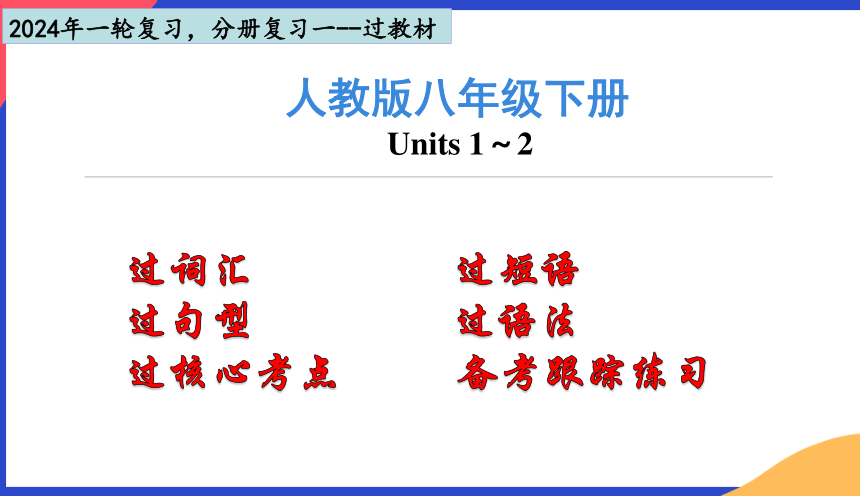 | |
| 格式 | pptx | ||
| 文件大小 | 1.6MB | ||
| 资源类型 | 试卷 | ||
| 版本资源 | 人教新目标(Go for it)版 | ||
| 科目 | 英语 | ||
| 更新时间 | 2024-03-12 08:11:18 | ||
图片预览

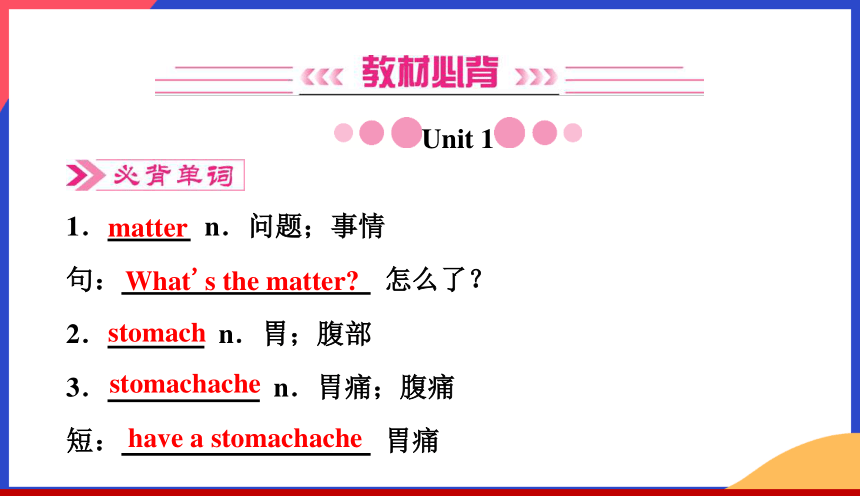
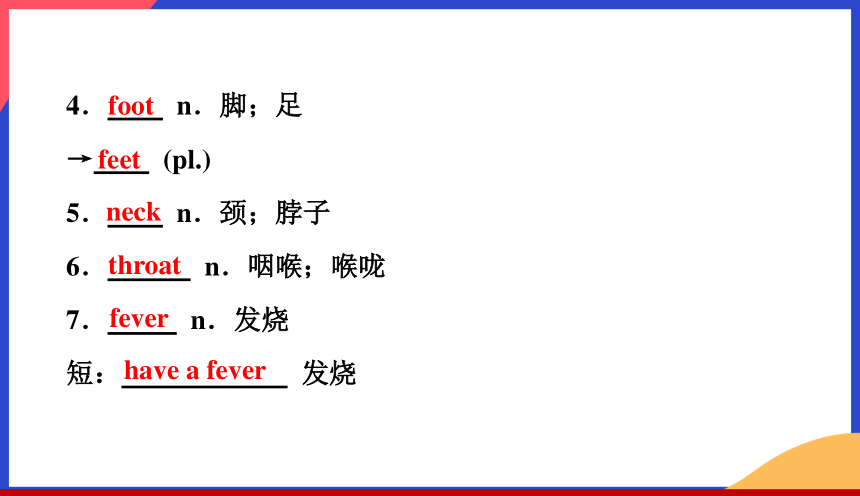
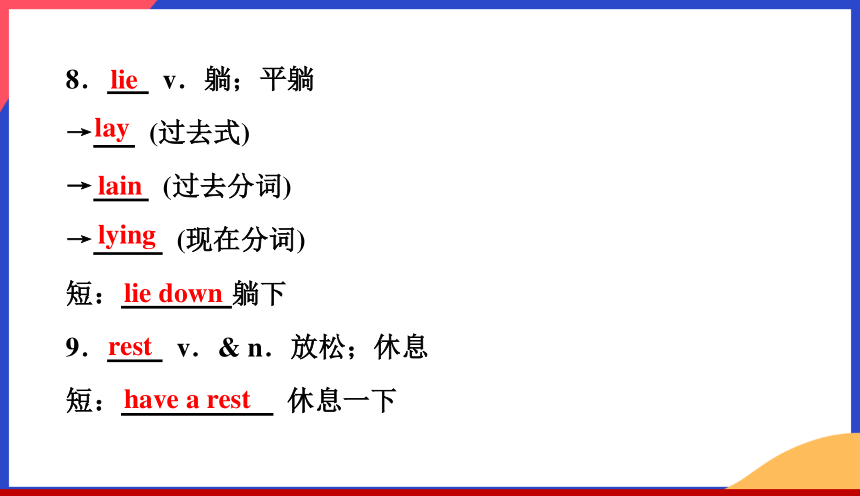
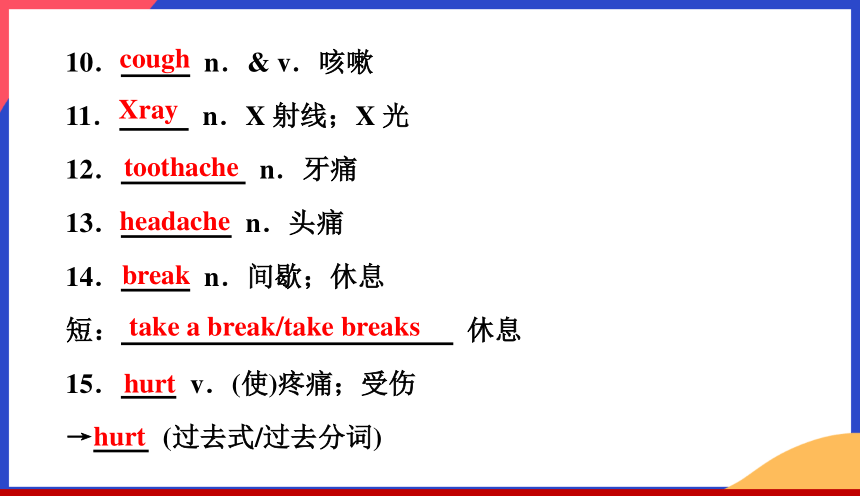
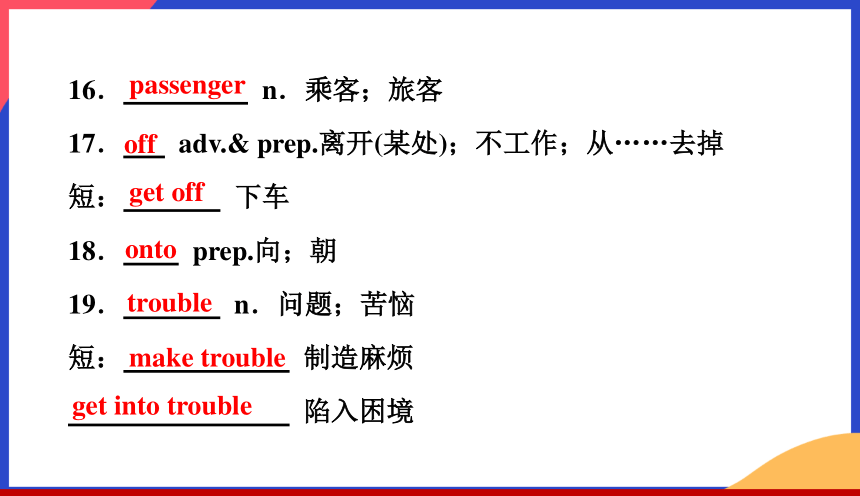
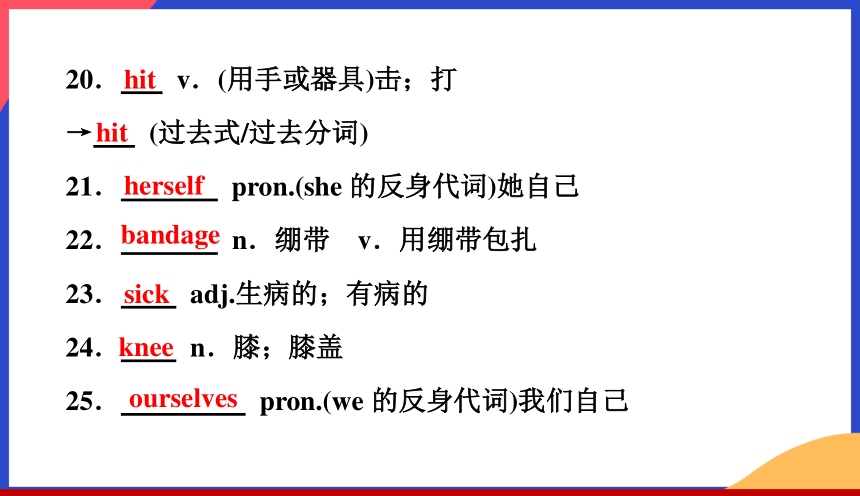
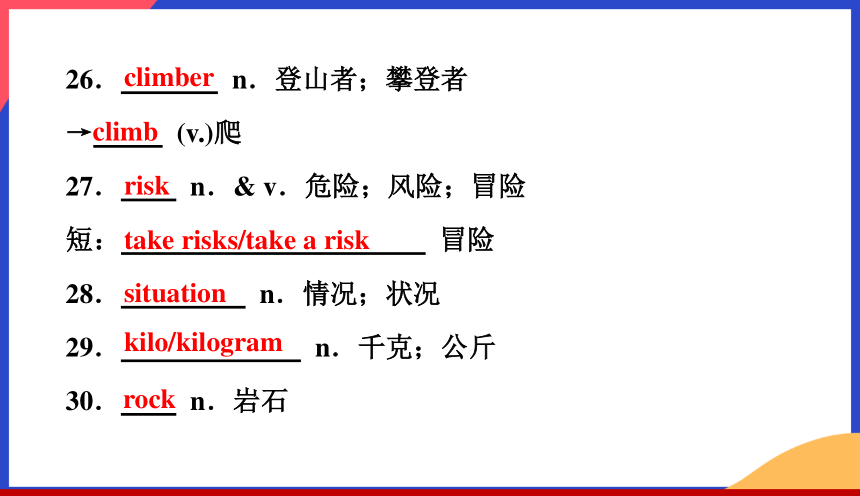
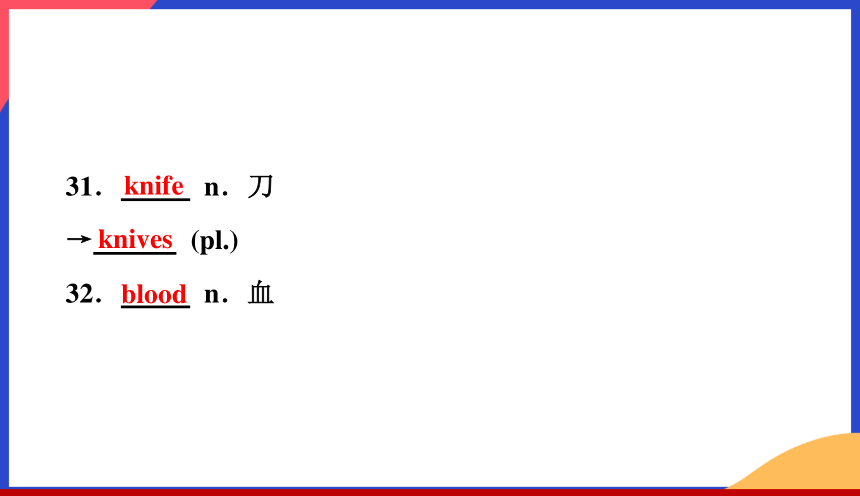
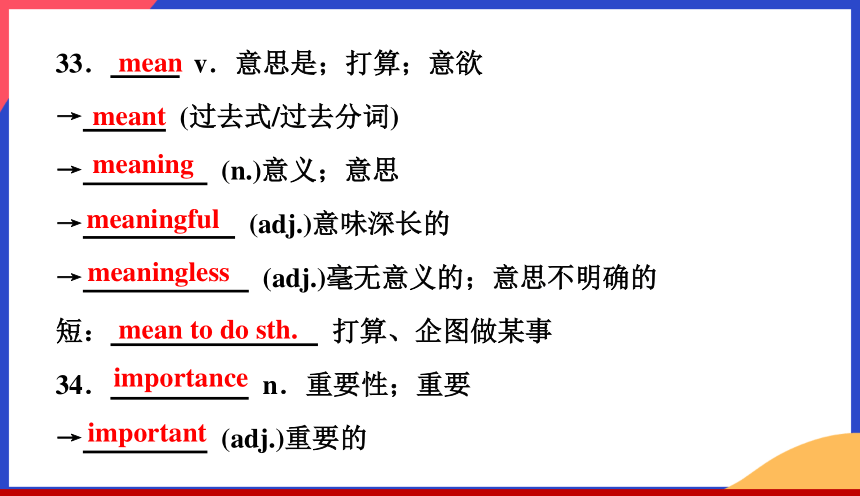
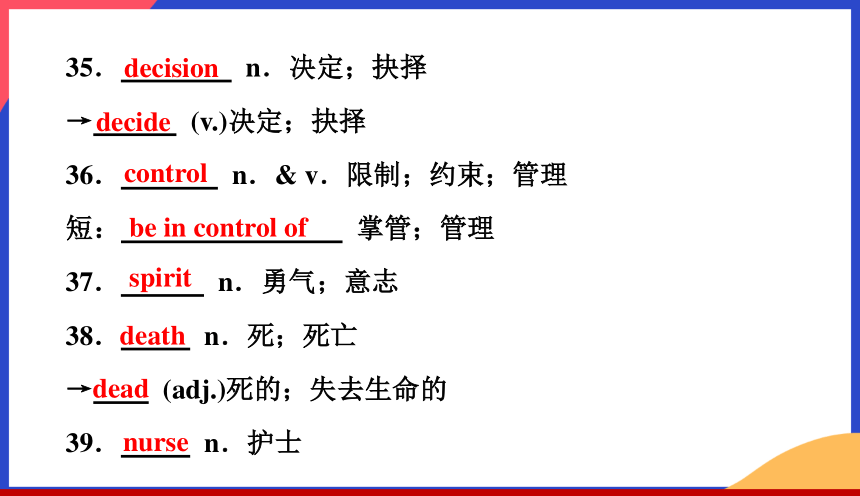
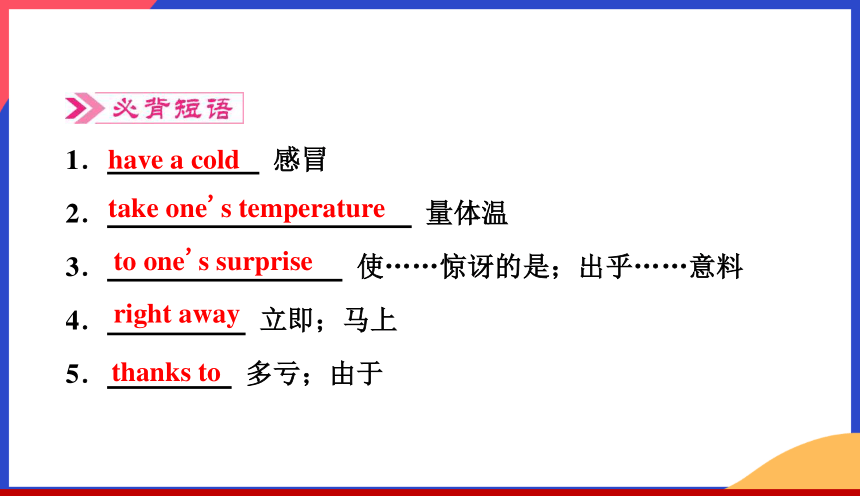
文档简介
(共145张PPT)
Units 1~2
过词汇 过短语
过句型 过语法 过核心考点 备考跟踪练习
2024年一轮复习,分册复习一--过教材
人教版八年级下册
matter
What's the matter
stomach
stomachache
have a stomachache
foot
feet
neck
throat
fever
have a fever
lie
lay
lain
lying
lie down
rest
have a rest
cough
X ray
toothache
headache
break
take a break/take breaks
hurt
hurt
passenger
off
get off
onto
trouble
make trouble
get into trouble
hit
hit
herself
bandage
sick
knee
ourselves
climber
climb
risk
take risks/take a risk
situation
kilo/kilogram
rock
knife
knives
blood
mean
meant
meaning
meaningful
meaningless
mean to do sth.
importance
important
decision
decide
control
be in control of
spirit
death
dead
nurse
have a cold
take one's temperature
to one's surprise
right away
thanks to
be used to
run out (of)
cut off
get out of
give up
cheer
cheer up
volunteer
sign
notice
lonely
alone
several
strong
strongly
feeling
satisfaction
satisfy
satisfied
be satisfied with…
joy
owner
journey
raise
raise money
repair
fix
fix up
broken
wheel
letter
Miss
disabled
blind
deaf
imagine
imagination
imagine doing sth.
difficulty
difficulties
have difficulty (in) doing sth.
open
opening
door
carry
carried
carry on
train
training
excited
exciting
be excited about
kindness
kind
clever
understand
understood
understanding
change
interest
interested
interesting
be interested in
sir
madam
8. climb (v.)→_________ (n.)登山者;攀登者
1. stomach (n.)→_____________ (n.)胃痛;腹痛
2. foot (n.)→______ (pl.)脚;足
3. tooth (n.)→_______ (pl.)牙齿→___________ (n.)牙痛
4. knife (n.)→________ (pl.)刀
5. lie (v.)→______ (过去式)→______ (过去分词)→_______ (现在分词)躺;平躺
6. hurt (v.)→______ (过去式/过去分词)(使)疼痛;受伤
7. hit (v.)→_____ (过去式/过去分词)→________ (现在分词)(用手或器具)击;打
词汇拓展
stomachache
feet
teeth
toothache
knives
lay
lain
lying
hurt
hit
hitting
climber
meant
9. mean (v.)→________ (过去式/过去分词)意思是;打算;意欲
decision
10. decide (v.)→__________ (n.)决定;抉择
death
11. die (v.)→_______ (n.)死;死亡
felt
feeling
12. feel (v.)→______ (过去式/过去分词)感受;觉得→_________ (n.)感觉;感触
satisfaction
13. satisfy (v.)→____________ (n.)满足;满意
training
14. train (v.)→ _________ (n.)训练;培训
excited
15. excite (v.)→_________ (adj.)激动的;兴奋的
importance
16. important (adj.)→____________ (n.)重要性;重要
loneliness
17. lonely (adj.)→___________ (n.)孤独;寂寞
19. kind (adj.)→__________ (n.)仁慈;善良
18. difficult (adj.)→___________ (n.) 困难;难题
difficulty
kindness
C
A
B
B
D
C
A
E
B
A
D
C
A
C
D
E
A
B
C
E
D
C
D
A
B
A
D
C
B
8. hit(绵阳:2020阅读D涉及)
熟义:(v.)(用手或器具)击;打;碰撞
(n.)击;打
生义:
A. v. 使突然想起 B. v. 产生不好的影响;打击;危害
C. v. 达到(某水平) D. n. 很受欢迎的人(或事物)
①Each day Carol took a photo of her husband in fancy dress and posted it on their blog(博客), which became a hit on the Internet.[2021武汉完形填空]________
D
生义:
A. v. 使突然想起 B. v. 产生不好的影响;打击;危害
C. v. 达到(某水平) D. n. 很受欢迎的人(或事物)
②According to the data from the WMO, temperatures on the Antarctica just hit 18.3 ℃.[2020绵阳阅读D]________
③A serious drought(干旱) hit these places. [2020衡阳阅读D]________
④I was leaving the office when it suddenly hit to me that I had forgotten my keys.________
C
B
A
9. raise(宜宾:2017阅读C涉及)
熟义:(v.) 募集;征集
生义:
A. v.(使)直立,站立 B. v. 举起 C. v. 唤起;引起
D. v. 抚养;养育 E. v. 增加;提高 F. v. 饲养
①Some suggest that tours in the poor areas can raise social care. [2017
宜宾阅读C]________
C
生义:
A. v.(使)直立,站立 B. v. 举起 C. v. 唤起;引起
D. v. 抚养;养育 E. v. 增加;提高 F. v. 饲养
②In the world of animals in nature, the young may not be so lucky or easy to find a foster parent if their parents die or lose the ability to raise them.[2021陕西完形填空第二节]________
③If you have a question, raise your hand.[2021天水阅读A]________
D
B
生义:
A. v. (使)直立,站立 B. v. 举起 C. v. 唤起;引起
D. v. 抚养;养育 E. v. 增加;提高 F. v. 饲养
④He raised his voice so that everybody could hear him.[上海牛津九(下)Unit 2 P24]________
⑤Some families raise cows, and others grow wheat. [译林牛津七(下)
Unit 3 P41]________
⑥He raised himself up on one elbow(肘).________
E
F
A
10. get off
熟义:下(飞机、火车、公共汽车等)
生义:
A. 动身 B. 下班 C. 清理
①At lunchtime, many people go there for a rest after they get off work. ________
②Your room is in a mess. It's time for you to get it off. ________
③In order to get to the airport earlier, we got off straight after breakfast. ________
B
C
A
1. _________________ 整个周末
2. _________________ 立刻;马上
3. _________________ 掌管;管理
4. _________________ 习惯于;适应于
5. _________________ 独自;单独
6. _________________ 打电话给(某人);征召
7. _________________ 照顾;非常喜欢
8. _________________ (使)变得更高兴;振奋起来
9. _________________ 打扫(或清除)干净
all weekend
at once / right away
be in control of
be used to
by oneself
call up
care for
cheer up
clean up
10. _______________ 想出;提出(主意、计划、回答等)
11. _______________ 切除
12. _______________ 修理;装饰
13. _______________ 拍X光片
14. _______________ 陷入;参与
15. _______________下车
16. _______________ 离开;从……出来
17. _______________ 晒伤
18. _______________ 赠送;捐赠
come up with
cut off
fix up
get an X-ray
get into
get off
get out of
get sunburned
give away
19. ______________________ 分发;散发
20. ______________________ 放弃
21. ______________________ 分发
22. ______________________ 感冒
23. ______________________ 发烧
24. ______________________ 心脏有问题
25. ______________________ 流鼻血
26. ______________________ 胃痛
27. ______________________ 喉咙痛
give out
give up
hand out
have a cold
have a fever
have a heart problem
have a nosebleed
have a stomachache
have a sore throat
28. ___________________ 及时
29. ___________________ 躺下
30. ___________________ 做决定
31. ___________________ 影响;有作用
32. ___________________ 推迟
33. ___________________ 筹钱
34. ___________________ 用尽;耗尽
35. ___________________ 建起;设立
36. ___________________ 以便
37. ___________________ 休息
in time
lie down
make a decision
make a difference
put off
raise money
run out (of)
set up
so that
take a break / breaks
38. _____________________ (外貌或行为)像
39. _____________________ 冒险
40. _____________________ 量体温
41. _____________________ 多亏;由于
42. _____________________ 再三考虑;仔细考虑
43. _____________________ 使某人惊讶的;出乎某人的意料
44. _____________________ 参加……选拔;试用
45. _____________________ 曾经……;过去……
take after
take a risk / risks
take one’s temperature
thanks to
think twice
to one’s surprise
try out
used to
1. —_________ ______ ________ _______ Ben 本怎么了?—He______ _________. He has a______ _______. 他弄伤了自己,他背痛。
himself
sore
back
What
should
do
2. —_______ ________ she _____ 她该怎么办?—She should take her temperature. 她应该量体温。
What’s
the
matter
with
hurt
重点句型
too
much
drink
enough
Thanks
to
in
time
3. She talked ______ ________yesterday and didn’t _______ _________water. 昨天她说话太多,并且没有喝足够的水。
4. _________ _____ Mr. Wang and the passengers, the man was saved by the docto rs _____ _______. 多亏了王先生和乘客们,那个人被医生及时挽救了。
help
to
clean
up
put
off
making
imagine
walk
easily
able
to
because
of
5. You could _______ _____ _______ _____ the city parks. 你可以帮助打扫城市公园。
6. We can’t ______ _____ _________ a plan. 我们不能推迟制订计划。
7. Or__________ you can’t _______ or use your hands________. 或者想象一下你不能走路或自如地使用你的双手。
8. I’m only ______ _____ have a “dog-helper” _________ _____ your kindness!因为你的仁慈,我才能拥有一只“导盲犬”!
9. She could read by herself _____ ______ ______ _____ four. 她在四岁的时候就能够独自阅读了。
at
the
age
of
考点透视
1. lie
vi. 躺;平躺 lie down 躺下
位于;说谎 lie to sb. 对某人撒谎
n. 谎话, 谎言 a white lie 善意的谎言
lie和lay
词条 词性 意义 过去式 过去分词 现在分词
lie 动词 躺;位于 lay lain lying
说谎 lied lied lying
lie 名词 谎言 lay 动词 放置;下蛋 laid laid laying
1) Sanya, a beautiful city, lies __________ the south of China.
A. in B. on C. to
(2021海南中考)
2) —Taiwan lies_____ the southeast of China, and it is_____ the
east of Fujian.
—OK, I want to visit it some day.
A. in; to B. on; to C. to; in D. to; on
(2021贵州铜仁中考)
A
A
2. rest n. & v. 放松;休息
【注意】
当 “the rest” 或“the rest of the + 名词”作主语时,谓语动词要与the rest表示的名词保持一致。
have a rest = take a rest / break = rest 休息
单项选择。
—Hello, Eric. You look tired.
—Yes, I’ve decided to have a good ________ by taking a walk or seeing a movie. I really need to relax.
A. meal B. sleep C. luck D. rest
(2021辽宁鞍山中考)
D
3. break n. 间歇;休息
v. 打破;打碎
take breaks (take a break) 休息
have a break (课间)休息一下
break the rule 违反规则
break the record 打破记录
break off 突然中止;中断
break down 停止运转;出故障
用break完成句子。
1) 我们已经工作了十个小时,没休息。
We have worked for ten hours without _________.
2) There was a car accident yesterday because somebody _____________________.
3) My TV set _____________ last night, so I didn’t watch the game.
4) He _________________ for the world 100 meters last month.
a break
broke the traffic rules
broke down
broke the record
4. trouble n. 问题;苦恼
get into trouble 惹麻烦;陷入困境
be in trouble 有烦事、有困难
have trouble in doing sth. 做某事有困难
英汉互译
1) 当我们遇到困难时必须保持冷静。(keep one’s cool)
___________________________________________________.
(2023山东滨州中考)
When we are in trouble, we should keep our cool
2) A group of elephants in Yunnan Province have trouble in ________ proper living place. We should help them.
A. find B. found C. to find D. finding
(2021四川泸州中考)
D
5. sick adj. 生病的;有病的
相同 生病的,都可作表语。
e.g. Alice was ill / sick yesterday.
不同 表“生病”时,sick可作定语,但ill不作定语。
e.g. Could you help the sick girl
sick & ill
请根据汉语意思完成英语句子。
1) 汤姆生病了,所以他今天没去学校。
Tom ______________, so he didn’t go to school today.
2) 当我们在轮船上的时候感到有点恶心。
When we were in the boat, we ____________________.
3) 这个孩子已经生病两天了。他总是感到恶心。
The child has been _______ for two days. He often feels _____.
was sick/ill
felt a little sick
sick / ill sick
6. breathe v. 呼吸
breathe in 吸气
breathe out 呼气
take a deep breath 做深呼吸
hold one’s breath 屏住呼吸
breath n. 呼吸
翻译句子。
1) 鸟儿在自由地呼吸。
The birds are breathing freely.
2) 生活在这里的人们每天呼吸着脏空气。
People living here breathe dirty air every day.
3) 当你紧张的时候,你可以做一下深呼吸。
When you are nervous, you can take a deep breath.
7. risk n. & v. 危险;风险;冒险
take a risk / take risks 冒险
at risk 有危险,冒风险
at the risk of ... 冒着……的风险
take the risk of doing ... 冒……风险
翻译句子。
老师冒着生命危险从那座楼里救出了男孩。
2) 我们将冒被困之险。
3) 别拿你自己的健康去冒险。
The teacher saved the boy from the building at the risk of her life.
We’ll take the risk of being caught.
Don’t risk your health.
8. mean v. 意思是;打算;意欲
mean doing sth. 意味着做某事
mean to do sth. 打算去做某事
meaning n. 意思,意义
meaningful adj. 有意义的,意味深长的
meaningless adj. 没有意义的
根据句意和汉语提示,在空白处填入一个适当的单词。
It is __________(有意义的) to do a survey on how to go green in the community. (2023江苏连云港)
meaningful
9. decision n. 决定;抉择
make a decision 做决定
decide v. 决定
decide to do sth. 决定做某事
根据所给中文完成句子翻译
无论你做什么事,应该学会自己做决定。
No matter what you do, you should learn to _______________________. (2023辽宁本溪、葫芦岛中考)
在空白处填入适当的内容(限1个单词)或括号内单词的正确形式, 使句子通顺完整。
I've decided __________ (stay) away from fried food and soft drinks since I had my medical exam.
(2023湖南永州中考)
make your own decision(s)
to stay
10. death n. 死;死亡 (不可数名词)
词条 词性 意义 用法
death n. 死;死亡 ∕
die v. 消失;灭亡;死亡 表示“死亡”的动作,不能和表示一段时间的状语连用
dead adj. 死的;失去生命的 常和be动词连用(be dead),表示死的状态
dying adj. 临死的;垂死的 是die的现在分词,不过常
用作形容词
dead, die, death & dying
用die的适当形式填空。
1) His grandma has been _______ for two years.
2) The lovely cat _______ on a cold night and its owner was very sad.
3) Look at the _______ dog; its mouth is still open.
4) His _______ was sudden and all of us were shocked completely.
dead
died
dying
death
1) The story reminds us that we have to decide between life and _________ (死)in a very dangerous situation.
(2021四川凉山中考)
2) The ________ (死) of Yuan Longping, Father of Hybrid Rice(杂交水稻), made us very sad.
(2021黑龙江绥化中考)
death
death
11. notice n. 通知;通告;注意
v. 注意到;意识到
notice sb. doing sth. 注意到某人正在做某事
notice sb. do sth. 注意到某人做某事(强调动作经常发生;或注意到某事发生的全过程)
You’ve probably ____________ how bright the snow is when sunlight falls on it.
(2021山东威海中考)
noticed
12. lonely adj. 孤独的;寂寞的
lonely adj. 孤单的;寂寞的 可作表语也可作定语,强调心理状态和主观感受,突出感到孤独和寂寞。
alone adj. 单独的;独自的 不能用于名词前,强调一人的客观状态,只陈述一个客观事实,在句中作表语。
adv. 单独;独自地 相当于by oneself,在句中作方式状语。
lonely,alone
完成句子。
1) 露西一个人的时候,通常会看电视。
Lucy usually watches TV when she is ______.
2) 我独自住在这个房子里,但是从不觉得孤独。
I live in the house _______, but I never feel _______.
3) 这个故事是关于一位孤独的老人和他的狗。
The story is about a(n) _______ old man and his dog.
alone
alone
lonely
lonely
1) — The old man lives ________, so he may feel ________.
— We should visit him twice a month.
A. alone; lonely B. lonely; alone C. alone; alone
(2023黑龙江绥化中考)
2) It is very relaxing to listen to light music by oneself.
A. together B. lonely C. Alone D. again
(2023贵州黔东南、黔南、黔西南三州中考)
A
C
13. repair v. 修理;修补
repair 需要一定技术,东西比较复杂。宾语常是汽车、房子、机器等。
His house is repaired once a year.
mend 不用复杂的技术和工具,如补破洞、裂痕等。宾语常是衣服、桌椅、玩具等。
repair,mend
请用mend或repair填空。
1) The radio is too old to .
2) Can my toy car
repair
be mended
14. difficulty n. 困难;难题
当difficulty表示做一件事的困难程度时,常作不可数名词,其前可用some,no等词修饰
have difficulty (in) doing sth. 做某事有困难
当difficulty表示具体的困难、难处、难点时,作可数名词
阅读下面短文,在空白处填写1个适当的单词或括号内所给单词的正确形式。
They kept their promise and faced life’s ___________ (difficulty) together, just as their wise father had taught them.
(2023四川乐山中考)
difficulties
15. excited adj. 激动的;兴奋的
excited 作表语时,主语常是人;作定语时,常用来修饰人。
The excited people danced when they heard the news.
exciting 作表语时,主语常是物;作定语时,常用来修饰物。
The movie isn’t exciting.
excited, exciting
用excited/exciting完成句子。
1) They waited and waited for something ________ to happen.
2) The children were ________ about winning the football match.
exciting
excited
阅读下面短文,在空白处填一个适当的词或填入括号中所给单词的正确形式。
1) They believe they will get the smart TV sets soon. I’m ___________(excite) we could do something to help others!
(2023湖南衡阳中考)
2) Students are ___________(excite) about the gardening lessons, too. (2023四川宜宾中考)
3) The whole process looks like an ___________(令人兴奋的) kung fu performance. (2023浙江台州中考)
excited
excited
exciting
16. raise v. 募集;征集
raise, rise
词汇 含义及用法 示例
raise (vt.,raised, raised) 使升高。强调“某人把某物举起来” raise one's hand 举手
增加 raise salaries 提高薪资
raise weight 增重
筹集(资金); 征集(人员) raise money 筹钱
raise an army 招兵
抚养,养育 raise pets 养宠物
词汇 含义及用法 示例
rise (vi. rose, risen) 上升。强调 “某人/ 某物自己站/升起来” The sun rises.
太阳升起。
The river rises.
水位上涨。
增长 The price rises.
价格上涨。
根据句意选择rise或raise的适当形式填空。
1) Look! The kite is ________ in the sky.
2) The price of vegetables is ________ rapidly.
3) Sally ________ her head when I called her.
4) Have you ever ________ chickens
5) How did they ________ money for the poor students
rising
rising
raised
raised
raise
1. have a cold = catch a cold 感冒
have a cold 感冒
have a cough 咳嗽
have a fever 发烧
have a/an + 疾病名词
have a headache 头疼
have a stomachache 胃疼
have a toothache 牙疼
have a + 身体部位 + -ache
have a sore throat 嗓子疼have a sore back 背疼
have a + sore + 身体部位
患病短语
根据汉语意思完成英语句子,每空词数不限。
1) 你什么时候感冒的?
When did you ______________
2) 她没有去上学因为她咳嗽。
She didn’t go to school because she ______________.
have a cold
had a cough
2. get off 下车
get 短语
get on 上车 get into 陷入;参与
get up 起床;起来 get back 回来
get out 出去 get ready 做好准备
get together 相聚 get over 克服
get on / along well with sb. 与某人和睦相处
请根据所给汉语意思完成下列英语句子(每空一词)。
1) 我想去南京路,你能告诉我什么时候下车吗?
I’m going to Nanjing Road. Can you tell me when to _______ _______.
2) 安上了公交车,并找了个位子坐下。
Ann _______ _______ the bus and found a seat to sit on.
got on
get
off
3. be used to 习惯于……;适应于……
词(组) 含义及用法
used to do sth. “过去常常做某事”,表示过去经常发生的动作或存在的状态,只是现在已不存在,其后接动词原形
be/get used to doing “习惯于做某事”,to是介词。用be时强调状态,用get时强调动作
be used to do sth. “被用于做某事”。是use sth. to do sth.的被动语态,相当于be used for doing sth.
be used as “被用作……,”介词as表示“作为……”,后面常接名词
根据句意选用used to, be used to, get used to的适当形式完成下列英语句子,每空词数不限。
1) Mr. Wang ________________ be a policeman.
2) Ice can ________________ build houses in the areas around the North Pole (北极).
3) He ________________ like listening to pop music but now he likes rock music.
4) I ________________ get up late, but now I ________________ getting up early.
used to
be used to
used to
used to
get / am used to
1) The teachers used to ________ key points on the blackboard, but now they are getting used to ________ them through PPTs.
A. write, showing B. writing, show C. write, show
(2023四川达州中考)
2) My grandfather used to ________ TV at home after dinner, but now he is used to ________ out for a walk.
A. watch; go B. watch; going C. watching; go
(2023湖南岳阳中考)
A
B
4. run out (of) 用尽;耗尽
run out (of) 及物动词短语,表主动意义,主语为人。
We ran out of coal and had to burn wood.
run out 用完 不及物动词短语,指(人)把东西用完(或花
完),其主语通常是时间、金钱、食物等无生命的名词。
Our supply of food has run out.
run out (of) / run out
完成句子。
1) All our supply of food has _________.
2) We are _______________ our gas. We can’t go any farther.
3) His patience has completely _________.
run out
running out of
run out
5. cut off 切除;剪下
cut down 砍倒;削减
cut up 切碎
cut in 插嘴;干预
cut in line 插队
cut out 删掉;切除
cut ... into pieces 将……切成片
cut短语
Ⅰ. 单项选择。
—Alice, could you help me ________ the meat I want to make
some dumplings for dinner.
—OK. I’ll do it right away.
A. put up B. give up C. use up D. cut up
Ⅱ. 翻译句子。
把这个香蕉切成片。
D
Cut the banana into pieces.
6. give up 放弃
give up doing sth. 放弃做某事
give out 分发;散发
give away 捐赠;赠给
give back 归还
give in 让步,屈服
give off 散发(液体、气体等)
give短语
1) Most neighbours _________ the habit of square dancing to create a quieter environment for us.
A. get into B. care about C. carry on D. give up
(2023江苏泰州中考)
2) —What abilities should a dog trainer have
—I think he should be responsible and never _________.
A. give away B. give out C. give back D. give up
(2023新疆中考)
D
D
7. come up with 想出;提出 (主意、计划、回答等)
catch up with(落后)赶上
keep up with 跟上,不落在……后面,
了解(最新的发展等)
put up with 忍受,容忍
end up with 以……结束等
come back 回来
come in 进来
come true 实现
come out 开花;出版;发行
come up 破土而出;发生
come on 快点;加油
come短语
—Could you please _________ some ideas for dealing with students’ problems
—Yes, less homework and more outdoor activities may be good ways.
A. come up with B. look back at C. try out
(2021青海中考)
A
8. put off 推迟
put down 放下;记下
put out 熄灭
put away 收起来
put on 穿上;戴上
put up 张贴;搭起,举起
put短语
1) Jimmy wants to _________ his trip because he is too busy with his studies.
A. put off B. wait for C. prepare for
(2021贵州安顺中考)
2) —Did you have a welcome party for Laura last night
—No, we didn’t. It was ________ because Laura was in
hospital.
A. put off B. taken off C. cut off D. turned off
(2021云南中考)
A
A
9. try out 参加……选拔;试用
try for 试图获得,力争,赢得
try on 试穿(衣物)
try one’s best 尽力
try短语
根据汉语提示,用句末括号内的英语单词完成句子。
The climbers ________________________ to reach the top when it began to snow heavily.
登山者们正在尽最大努力登顶,这时开始下大雪了。(best)
(2023湖北荆州中考)
根据所给中文完成句子翻译。
买裤子之前要先试穿。
_______ _______ the trousers before you buy them.
(2023辽宁营口中考)
were doing/trying their best
Try on
10. set up 建起;设立
set about 开始(做某事)
set down 放下;记下
set off 动身,出发
set out 动身,出发;着手,开始
set短语
阅读下列各小题,根据汉语及句末括号内的动词提示,用相关动词短语的适当形式完成句子。
中国在很多国家已经建立了5G基站。(set)
China _____________________ 5G stations in many countries.
has (already) set up
1. What’s the matter
常用来询问病情或某人遇到了什么麻烦、问题等,也可以用来询问某物出了什么故障。
“What's the matter (with sb.) ”的答语常用“have+a+表示疾病或病痛的名词”短语回答。
得知某人生病或住院后,常用“I'm sorry to hear that.”来回答。
What’s wrong (with sb.)
某人怎么了?
What’s the matter (with sb.)
What’s the trouble (with sb.)
What’s up with sb.
What’s happened to sb.
What’s the problem with sb.
Ⅰ. 单项选择
—Hi, Gao Min. _______
—I hurt my leg this morning.
A. How are you B. How's the weather
C. What do you do D. What's the matter
Ⅱ. 同义句转换
What's the matter with your bike
What's ________ ________ your bike
D
wrong with
2. At 9:00 a.m. yesterday, bus No. 26 was going along Zhonghua Road when the driver saw an old man lying on the side of the road.
see sb. doing sth. 看到某人正在做某事
强调动作正在进行
see sb. do sth. 看到某人做某事
强调动作经常发生或看到某事发生的全过程
I saw Lily ________ when I passed her room.
A. dance B. dancing C. to dance
(2023黑龙江绥化中考)
B
根据所给汉语句子完成英语句子 (2020山东威海中考)
昨天我在海滩上散步的时候,看到一个画家在画画。
When/While I was walking on the beach. I saw a penitent/an artist drawing/painting (a picture) yesterday.
3. You helped to make it possible for me to have Lucky.
make it possible (for sb.) to do sth.
使(某人)做某事成为可能
“make it +形容词+ to do sth.” 意为“使做某事…… ”,it在句中作形式宾语,形容词作宾语补足语,动词不定式是真正的宾语。能用于该句型的动词还有think, feel, find等。
e.g. Do you think it difficult for him to answer these questions 你认为他来回答这些问题很难吗?
单项选择。
1) Televisions have made _______ possible for us to watch movies at home.
A. that B. this C. it D. they
完成句子。
2) Our teacher __________________ (使变得有趣) to learn English.
C
makes it interesting
情态动词should / shouldn’t (Unit 1)
情态动词 含义及用法 例句
should “应该”,表示要求和命令,也可以表示劝告或建议。 后跟动词原形,没有人称和数的变化。 You should have a good rest first.
表示征询意见,常用于疑问句中。 When should we begin our discussion
shouldn't “不应该”。 You shouldn't start eating first if there are older people at the table.
1. Earthquakes can be very dangerous. We _________ learn to protect ourselves.
A. might B. should C. could D. would
(2023江苏连云港中考)
2. —Excuse me, but we _______ wait in line to get on the
subway.
—I’m sorry.
A. might B. would C. could D. should
(2023湖北武汉中考)
B
D
反身代词由“人称代词的宾格或形容词性物主代词+ -self / -selves”构成,有人称和数的变化,“本人;本身”,为加强语气也常译为“亲自;自己”。
第一人称 第二人称 第三人称
单数 myself yourself himself
herself
itself
复数 ourselves yourselves themselves
反身代词 (Unit 1)
用法 例句
作宾语,位于动词或介词之后 Everyone celebrated the labour festival and enjoyed themselves (they).
作表语,位于系动词之后 The poor boy in the story was myself (I).
作同位语,位于名词或代词之 后,或位于句末 England itself (it) is part of an island, and you are always near the sea.
dress oneself 给自己穿衣服
enjoy oneself 玩得开心
help oneself to sth. 随便吃点……
learn by oneself 自学
teach oneself 自学
cut oneself 割 / 切着自己
take care of oneself 照顾自己
hurt oneself 伤着自己
keep ... to oneself 保密
反身代词通常用在一些表达中:
1. —I saw your grandma using Douyin on the phone. Who
taught her
—Nobody. She taught ________.
A. himself B. myself C. herself D. yourself
(2023四川遂宁中考)
2. —Where did you get the toy car
—From Betty. She made it _______.
A. myself B. himself C. herself D. yourself
(2023河北中考)
C
C
3. —My best friend is more popular than me. I want to be like
him.
—It's not necessary to be the same. You should just be
_________.
A. himself B. yourself C. myself
(2023湖南郴州中考)
4. Welcome you all to China and enjoy _________ here.
A. yourself B. yourselves C. themselves D. himself
(2023贵州黔东南、黔南、黔西南三州中考)
B
B
动词不定式是由“to+动词原形”构成的,有时to可以省略,它是非谓语动词的一种。
动词不定式在句子中不能单独作谓语,也没有人称和数的变化,其否定结构是“not to +动词原形”。
动词不定式 (Unit 2)
1. 作主语。动词不定式作主语时,可用形式主语it代替,而把真正的主语——动词不定式后置。
e.g. To drive so fast is dangerous.
=It is dangerous to drive so fast.
2. 作表语。
e.g. His dream is to be a doctor.
动词不定式在句中的作用
3. 作宾语
agree 同意 afford 负担得起 choose 选择
dare 敢 decide 决定 expect 期望
help 帮助 hope 希望 manage 设法
offer 提供 plan 计划 prefer 更喜欢
promise 许诺 prepare 准备 refuse 拒绝
want/would like 想要 wish 希望
常位于谓语动词之后。后常用动词不定式作宾语的动词/词组有:
4. 作宾语补足语
常见接动词不定式作宾语补足语的词(组)有:
advise 建议 allow 允许 ask 要求
expect 期望 force 强迫 teach 教
encourage 鼓励 invite 邀请
order 命令 tell 告诉 want 想要
warn 警告 wish 希望 would like 想要
1) 在使役动词及感官动词后用作宾语补足语的不定式必须省略to。但在变被动句时,需要补上不定式符号to (let除外),这类词常用的有:
一感:feel
二听:listen to, hear
三让:let, have, make
四看:watch, see, look at, notice
2) help后带to或不带to均可。
e.g. She still works there once a week to help kids (to) learn to read.
e.g. His funny action made me laugh.
→I was made to laugh by his funny action.
5. 作定语。动词不定式作定语时,要放在所修饰词的后面。
e.g. The best way to learn English is reading aloud.
6. 作状语。 动词不定式作状语时,可表示目的、结果等。
e.g. To get a good seat she arrived at the hall early.
(表示目的)
The boy is old enough to take care of himself.
(表示结果)
1. what, which, who, where, when, how等疑问词与不定式连用,在句中起名词的作用,可以作宾语。
e.g. He doesn’t know what to do next.
2. had better, would rather, have nothing to do but ..., Why not ... , Will / Would / Could you please ... 后面接不带to的动词不定式。
e.g. You had better do some exercise every day.
注意:
It's one's turn to do sth. 轮到某人做某事了
It takes/took sb. some time to do sth.某人花费多长时间做某事
It's time for sb. to do sth. 某人做某事的时候到了
adj.+enough to do sth. 足够……做某事
too...to... 太……而不能……
a/an+ adj.+way to do sth. 一个……的做某事的方法
be able to do sth. 能够做某事
take action to do sth. 采取行动做某事
使用动词不定式的固定句型/结构:
1. —What are you going to do this summer vacation
—I plan ________ Hua Hua, a nearly 3-year-old lovely panda
in Chengdu.
A. see B. saw C. seeing D. to see
(2023四川泸州中考)
2. Today is Father’s Day, and I plan _______ a dinner for my father.
A. to prepare B. preparing C. prepared D. prepare
(2023云南中考)
D
A
3. Science is my favourite subject, so I have prepared _______ the STEAM Club.
A. join B. joining C. to join D.to joining
(2023江苏扬州)
4. It's reported that China plans ________ astronauts to the moon before 2030.
A. send B. sending C. to send
(2023福建中考)
C
C
5. —Safety is very important to all of us.
—I agree. We students should learn ________ ourselves in the
daily life.
A. where to hold B. what to visit
C. how to protect D. why to help
(2023湖北孝感中考)
6. —Are you going to read the book Journey to the West
—Yes, our teacher expect us _________ such traditional
Chinese books.
A. read B. reading C. to read
(2023湖南郴州中考)
C
C
备考跟踪训练
一、单项选择。
1.(2021,黔东南州)—Yuan Longping _____ people’s food supply (粮食供应) around the world during his life.
—Yeah. He is regarded as the “Father of Hybrid Rice” (杂交水稻之父).
A. looked up B. depended on C. cared for D. agreed with
C
2.—We can always find something good in a bad _____ if we look for it.
—It’s so true. Let’s make full use of what comes.(2021,扬州)
A. situation B. direction C. instruction D. competition
A
3.When you go rock climbing, you need to be careful so that you don’t have a (n) _____.
A. chance B. accident C. secret D. action
B
4.—I don’t care what people think.
—Well, you _____. Some opinions are worth weighing.
A. might B. should C. could D. would
B
5.Some volunteers are going to_____ the central park. Let’s join them.
A. put up B. clean up C. look up D. give up
B
6.We mustn’t _____ the bus until it stops.
A. get off B. put off C. turn off D. fall off
A
7.My brother often _____ his spare time to help me with my spoken English.
A. puts up B. gives up C. opens up D. tidies up
B
8.They hope _____ the basketball match.
A. win B. won C. to win D. winning
C
B
9.Diana used to ____ to work, but now she is used to __ because the road is crowded and she wants to keep fit.
A.drive;walk
B.drive;walking
C.driving;walk
D.driving;walking
10.—You look down! What’s up
—_____.
A. I’m watching a sitcom B. My mom is ill
C. I finished high school D. There is a watch
B
语境练词汇
语法填空
一、用括号内单词的正确形式填空(不超过三个单词)
1. Zhang Hong, a Chinese, is the first Asian blind ________(climb) who has reached the top of Qomolangma.[2021成都选择填空]
2. I ________(feel) lost and kept asking myself what fun I could have during the day. [2020温州词汇应用]
climber
微 语 境 夯 基
felt
3. The football fans ________(cheer) as soon as they heard the exciting news. [2019葫芦岛单选]
4. That was a day of great ____________(important) in Josh's life because he learned to be more open about his condition.[2020大庆阅读]
5. Don't carry sharp things like ________(knife) or scissors in your pocket.[冀教九(全)Unit 3 P45]
6. Spider man can't fly, but he climbs up buildings with his hands and ________(foot). [外研八(下)Module 5 P34]
cheered
importance
knives
feet
7. When we got to the place of the accident, the car was in bad shape from ________(hit) a tree.[鲁教八(上)Unit 3 P20]
8. After his supper, Gork ________(lie) down on his bed and fell asleep almost immediately.[牛津上海版八(上)Module 3 P111]
9. Mr. Wang ________(carry) a graduation cake into the classroom and sang a song to us. He wished us a good future.
10. During my whole life I have received the ___________(kind) from many strangers. They taught me a lesson—people are more important than things.
hitting
lay
carried
kindness
二、在空白处填入1个恰当的词
11. We have to put ________ the school trip because of the bad weather.[2020临沂单项填空]
12. Every time I want to give ________, my parents always encourage me to keep trying.[2019北部湾经济区综合填空]
13. If you take ________ risk, you're doing something that you know might be dangerous. [冀教九(全)Unit 1 P14]
14. Our class is trying to come up ________ some ideas to cheer up sick children because they are often sad. [鲁教七(下)Unit 8 P59]
off
up
a
with
B. 语篇提能
Sheng Xiaohan is a middle school student in Shanghai. He's also a hero. On his way home from school one evening, he31 . ________
(notice) a man who had collapsed(晕倒) on the sidewalk. There were several people standing around. They were 32. ________(worry) but were afraid to touch him. Sheng, however, remembered the first aid lessons he had learnt at school and checked the man's body 33. _________(careful). Sheng saved the man's life before the doctor arrived and sent34 . ________(he) to the hospital.
Passage 1
noticed
worried
carefully
him
No one knew his heroic actions35 . ________ the man came to the school to thank him sincerely. Later, Sheng said, “I think most36 . ________ my classmates would have done the same thing if they met such a situation.”
Unlike Sheng, many people are unwilling to help people who are in37 . ___________(danger) situations. They fear that they may get themselves into trouble. However, there is no need for us to be afraid of the38 . ________(risk), for people's lives always come first.
until
of
dangerous
risks
Nowadays, there are new laws that can give enough 39. _________
(protect) to people who try to help others. And some schools carry out many first aid lessons40 . ________(train) students' reaction(反应) ability. If you know first aid well, someday you may be able to save a life, too.
protection
to train
My name is Lucas. I enjoy visiting art museums and historic places. I also like to express my41 . ________(feeling) through artworks and photos. And I think it's a good chance 42. ______________
(understand) something new.
Passage 2
feelings
to understand
In the past, I always spent some time43 . __________(imagine) doing some volunteer work in the Sheffield Museum. Last summer, I made a44 . ________(decide) to go for it. A few days later, the director of the museum45 . ________(call) me. I was really excited. 46. ________ July 10, I started doing some two hour shifts(换班制) twice a week. My task was to welcome visitors. In November, I joined the “Talking Tables” project. My job is47 . ________(total) different. I had to look after these machines.
imagining
decision
called
On
totally
In December, I attended a seasonal celebration for volunteers at the Sheffield Museum. It was48 . ________ amazing activity with a buffet
(自助餐). History professor Stephen Nissenbaum gave a speech on mid winter traditions around the world.
I have found the museum workers and the volunteers to be very49 . ________(friend). We didn't work alone. And I have also become a50 . ________(good) person than before. I will never forget this special experience because it made a big difference to my life.
an
friendly
better
Units 1~2
过词汇 过短语
过句型 过语法 过核心考点 备考跟踪练习
2024年一轮复习,分册复习一--过教材
人教版八年级下册
matter
What's the matter
stomach
stomachache
have a stomachache
foot
feet
neck
throat
fever
have a fever
lie
lay
lain
lying
lie down
rest
have a rest
cough
X ray
toothache
headache
break
take a break/take breaks
hurt
hurt
passenger
off
get off
onto
trouble
make trouble
get into trouble
hit
hit
herself
bandage
sick
knee
ourselves
climber
climb
risk
take risks/take a risk
situation
kilo/kilogram
rock
knife
knives
blood
mean
meant
meaning
meaningful
meaningless
mean to do sth.
importance
important
decision
decide
control
be in control of
spirit
death
dead
nurse
have a cold
take one's temperature
to one's surprise
right away
thanks to
be used to
run out (of)
cut off
get out of
give up
cheer
cheer up
volunteer
sign
notice
lonely
alone
several
strong
strongly
feeling
satisfaction
satisfy
satisfied
be satisfied with…
joy
owner
journey
raise
raise money
repair
fix
fix up
broken
wheel
letter
Miss
disabled
blind
deaf
imagine
imagination
imagine doing sth.
difficulty
difficulties
have difficulty (in) doing sth.
open
opening
door
carry
carried
carry on
train
training
excited
exciting
be excited about
kindness
kind
clever
understand
understood
understanding
change
interest
interested
interesting
be interested in
sir
madam
8. climb (v.)→_________ (n.)登山者;攀登者
1. stomach (n.)→_____________ (n.)胃痛;腹痛
2. foot (n.)→______ (pl.)脚;足
3. tooth (n.)→_______ (pl.)牙齿→___________ (n.)牙痛
4. knife (n.)→________ (pl.)刀
5. lie (v.)→______ (过去式)→______ (过去分词)→_______ (现在分词)躺;平躺
6. hurt (v.)→______ (过去式/过去分词)(使)疼痛;受伤
7. hit (v.)→_____ (过去式/过去分词)→________ (现在分词)(用手或器具)击;打
词汇拓展
stomachache
feet
teeth
toothache
knives
lay
lain
lying
hurt
hit
hitting
climber
meant
9. mean (v.)→________ (过去式/过去分词)意思是;打算;意欲
decision
10. decide (v.)→__________ (n.)决定;抉择
death
11. die (v.)→_______ (n.)死;死亡
felt
feeling
12. feel (v.)→______ (过去式/过去分词)感受;觉得→_________ (n.)感觉;感触
satisfaction
13. satisfy (v.)→____________ (n.)满足;满意
training
14. train (v.)→ _________ (n.)训练;培训
excited
15. excite (v.)→_________ (adj.)激动的;兴奋的
importance
16. important (adj.)→____________ (n.)重要性;重要
loneliness
17. lonely (adj.)→___________ (n.)孤独;寂寞
19. kind (adj.)→__________ (n.)仁慈;善良
18. difficult (adj.)→___________ (n.) 困难;难题
difficulty
kindness
C
A
B
B
D
C
A
E
B
A
D
C
A
C
D
E
A
B
C
E
D
C
D
A
B
A
D
C
B
8. hit(绵阳:2020阅读D涉及)
熟义:(v.)(用手或器具)击;打;碰撞
(n.)击;打
生义:
A. v. 使突然想起 B. v. 产生不好的影响;打击;危害
C. v. 达到(某水平) D. n. 很受欢迎的人(或事物)
①Each day Carol took a photo of her husband in fancy dress and posted it on their blog(博客), which became a hit on the Internet.[2021武汉完形填空]________
D
生义:
A. v. 使突然想起 B. v. 产生不好的影响;打击;危害
C. v. 达到(某水平) D. n. 很受欢迎的人(或事物)
②According to the data from the WMO, temperatures on the Antarctica just hit 18.3 ℃.[2020绵阳阅读D]________
③A serious drought(干旱) hit these places. [2020衡阳阅读D]________
④I was leaving the office when it suddenly hit to me that I had forgotten my keys.________
C
B
A
9. raise(宜宾:2017阅读C涉及)
熟义:(v.) 募集;征集
生义:
A. v.(使)直立,站立 B. v. 举起 C. v. 唤起;引起
D. v. 抚养;养育 E. v. 增加;提高 F. v. 饲养
①Some suggest that tours in the poor areas can raise social care. [2017
宜宾阅读C]________
C
生义:
A. v.(使)直立,站立 B. v. 举起 C. v. 唤起;引起
D. v. 抚养;养育 E. v. 增加;提高 F. v. 饲养
②In the world of animals in nature, the young may not be so lucky or easy to find a foster parent if their parents die or lose the ability to raise them.[2021陕西完形填空第二节]________
③If you have a question, raise your hand.[2021天水阅读A]________
D
B
生义:
A. v. (使)直立,站立 B. v. 举起 C. v. 唤起;引起
D. v. 抚养;养育 E. v. 增加;提高 F. v. 饲养
④He raised his voice so that everybody could hear him.[上海牛津九(下)Unit 2 P24]________
⑤Some families raise cows, and others grow wheat. [译林牛津七(下)
Unit 3 P41]________
⑥He raised himself up on one elbow(肘).________
E
F
A
10. get off
熟义:下(飞机、火车、公共汽车等)
生义:
A. 动身 B. 下班 C. 清理
①At lunchtime, many people go there for a rest after they get off work. ________
②Your room is in a mess. It's time for you to get it off. ________
③In order to get to the airport earlier, we got off straight after breakfast. ________
B
C
A
1. _________________ 整个周末
2. _________________ 立刻;马上
3. _________________ 掌管;管理
4. _________________ 习惯于;适应于
5. _________________ 独自;单独
6. _________________ 打电话给(某人);征召
7. _________________ 照顾;非常喜欢
8. _________________ (使)变得更高兴;振奋起来
9. _________________ 打扫(或清除)干净
all weekend
at once / right away
be in control of
be used to
by oneself
call up
care for
cheer up
clean up
10. _______________ 想出;提出(主意、计划、回答等)
11. _______________ 切除
12. _______________ 修理;装饰
13. _______________ 拍X光片
14. _______________ 陷入;参与
15. _______________下车
16. _______________ 离开;从……出来
17. _______________ 晒伤
18. _______________ 赠送;捐赠
come up with
cut off
fix up
get an X-ray
get into
get off
get out of
get sunburned
give away
19. ______________________ 分发;散发
20. ______________________ 放弃
21. ______________________ 分发
22. ______________________ 感冒
23. ______________________ 发烧
24. ______________________ 心脏有问题
25. ______________________ 流鼻血
26. ______________________ 胃痛
27. ______________________ 喉咙痛
give out
give up
hand out
have a cold
have a fever
have a heart problem
have a nosebleed
have a stomachache
have a sore throat
28. ___________________ 及时
29. ___________________ 躺下
30. ___________________ 做决定
31. ___________________ 影响;有作用
32. ___________________ 推迟
33. ___________________ 筹钱
34. ___________________ 用尽;耗尽
35. ___________________ 建起;设立
36. ___________________ 以便
37. ___________________ 休息
in time
lie down
make a decision
make a difference
put off
raise money
run out (of)
set up
so that
take a break / breaks
38. _____________________ (外貌或行为)像
39. _____________________ 冒险
40. _____________________ 量体温
41. _____________________ 多亏;由于
42. _____________________ 再三考虑;仔细考虑
43. _____________________ 使某人惊讶的;出乎某人的意料
44. _____________________ 参加……选拔;试用
45. _____________________ 曾经……;过去……
take after
take a risk / risks
take one’s temperature
thanks to
think twice
to one’s surprise
try out
used to
1. —_________ ______ ________ _______ Ben 本怎么了?—He______ _________. He has a______ _______. 他弄伤了自己,他背痛。
himself
sore
back
What
should
do
2. —_______ ________ she _____ 她该怎么办?—She should take her temperature. 她应该量体温。
What’s
the
matter
with
hurt
重点句型
too
much
drink
enough
Thanks
to
in
time
3. She talked ______ ________yesterday and didn’t _______ _________water. 昨天她说话太多,并且没有喝足够的水。
4. _________ _____ Mr. Wang and the passengers, the man was saved by the docto rs _____ _______. 多亏了王先生和乘客们,那个人被医生及时挽救了。
help
to
clean
up
put
off
making
imagine
walk
easily
able
to
because
of
5. You could _______ _____ _______ _____ the city parks. 你可以帮助打扫城市公园。
6. We can’t ______ _____ _________ a plan. 我们不能推迟制订计划。
7. Or__________ you can’t _______ or use your hands________. 或者想象一下你不能走路或自如地使用你的双手。
8. I’m only ______ _____ have a “dog-helper” _________ _____ your kindness!因为你的仁慈,我才能拥有一只“导盲犬”!
9. She could read by herself _____ ______ ______ _____ four. 她在四岁的时候就能够独自阅读了。
at
the
age
of
考点透视
1. lie
vi. 躺;平躺 lie down 躺下
位于;说谎 lie to sb. 对某人撒谎
n. 谎话, 谎言 a white lie 善意的谎言
lie和lay
词条 词性 意义 过去式 过去分词 现在分词
lie 动词 躺;位于 lay lain lying
说谎 lied lied lying
lie 名词 谎言 lay 动词 放置;下蛋 laid laid laying
1) Sanya, a beautiful city, lies __________ the south of China.
A. in B. on C. to
(2021海南中考)
2) —Taiwan lies_____ the southeast of China, and it is_____ the
east of Fujian.
—OK, I want to visit it some day.
A. in; to B. on; to C. to; in D. to; on
(2021贵州铜仁中考)
A
A
2. rest n. & v. 放松;休息
【注意】
当 “the rest” 或“the rest of the + 名词”作主语时,谓语动词要与the rest表示的名词保持一致。
have a rest = take a rest / break = rest 休息
单项选择。
—Hello, Eric. You look tired.
—Yes, I’ve decided to have a good ________ by taking a walk or seeing a movie. I really need to relax.
A. meal B. sleep C. luck D. rest
(2021辽宁鞍山中考)
D
3. break n. 间歇;休息
v. 打破;打碎
take breaks (take a break) 休息
have a break (课间)休息一下
break the rule 违反规则
break the record 打破记录
break off 突然中止;中断
break down 停止运转;出故障
用break完成句子。
1) 我们已经工作了十个小时,没休息。
We have worked for ten hours without _________.
2) There was a car accident yesterday because somebody _____________________.
3) My TV set _____________ last night, so I didn’t watch the game.
4) He _________________ for the world 100 meters last month.
a break
broke the traffic rules
broke down
broke the record
4. trouble n. 问题;苦恼
get into trouble 惹麻烦;陷入困境
be in trouble 有烦事、有困难
have trouble in doing sth. 做某事有困难
英汉互译
1) 当我们遇到困难时必须保持冷静。(keep one’s cool)
___________________________________________________.
(2023山东滨州中考)
When we are in trouble, we should keep our cool
2) A group of elephants in Yunnan Province have trouble in ________ proper living place. We should help them.
A. find B. found C. to find D. finding
(2021四川泸州中考)
D
5. sick adj. 生病的;有病的
相同 生病的,都可作表语。
e.g. Alice was ill / sick yesterday.
不同 表“生病”时,sick可作定语,但ill不作定语。
e.g. Could you help the sick girl
sick & ill
请根据汉语意思完成英语句子。
1) 汤姆生病了,所以他今天没去学校。
Tom ______________, so he didn’t go to school today.
2) 当我们在轮船上的时候感到有点恶心。
When we were in the boat, we ____________________.
3) 这个孩子已经生病两天了。他总是感到恶心。
The child has been _______ for two days. He often feels _____.
was sick/ill
felt a little sick
sick / ill sick
6. breathe v. 呼吸
breathe in 吸气
breathe out 呼气
take a deep breath 做深呼吸
hold one’s breath 屏住呼吸
breath n. 呼吸
翻译句子。
1) 鸟儿在自由地呼吸。
The birds are breathing freely.
2) 生活在这里的人们每天呼吸着脏空气。
People living here breathe dirty air every day.
3) 当你紧张的时候,你可以做一下深呼吸。
When you are nervous, you can take a deep breath.
7. risk n. & v. 危险;风险;冒险
take a risk / take risks 冒险
at risk 有危险,冒风险
at the risk of ... 冒着……的风险
take the risk of doing ... 冒……风险
翻译句子。
老师冒着生命危险从那座楼里救出了男孩。
2) 我们将冒被困之险。
3) 别拿你自己的健康去冒险。
The teacher saved the boy from the building at the risk of her life.
We’ll take the risk of being caught.
Don’t risk your health.
8. mean v. 意思是;打算;意欲
mean doing sth. 意味着做某事
mean to do sth. 打算去做某事
meaning n. 意思,意义
meaningful adj. 有意义的,意味深长的
meaningless adj. 没有意义的
根据句意和汉语提示,在空白处填入一个适当的单词。
It is __________(有意义的) to do a survey on how to go green in the community. (2023江苏连云港)
meaningful
9. decision n. 决定;抉择
make a decision 做决定
decide v. 决定
decide to do sth. 决定做某事
根据所给中文完成句子翻译
无论你做什么事,应该学会自己做决定。
No matter what you do, you should learn to _______________________. (2023辽宁本溪、葫芦岛中考)
在空白处填入适当的内容(限1个单词)或括号内单词的正确形式, 使句子通顺完整。
I've decided __________ (stay) away from fried food and soft drinks since I had my medical exam.
(2023湖南永州中考)
make your own decision(s)
to stay
10. death n. 死;死亡 (不可数名词)
词条 词性 意义 用法
death n. 死;死亡 ∕
die v. 消失;灭亡;死亡 表示“死亡”的动作,不能和表示一段时间的状语连用
dead adj. 死的;失去生命的 常和be动词连用(be dead),表示死的状态
dying adj. 临死的;垂死的 是die的现在分词,不过常
用作形容词
dead, die, death & dying
用die的适当形式填空。
1) His grandma has been _______ for two years.
2) The lovely cat _______ on a cold night and its owner was very sad.
3) Look at the _______ dog; its mouth is still open.
4) His _______ was sudden and all of us were shocked completely.
dead
died
dying
death
1) The story reminds us that we have to decide between life and _________ (死)in a very dangerous situation.
(2021四川凉山中考)
2) The ________ (死) of Yuan Longping, Father of Hybrid Rice(杂交水稻), made us very sad.
(2021黑龙江绥化中考)
death
death
11. notice n. 通知;通告;注意
v. 注意到;意识到
notice sb. doing sth. 注意到某人正在做某事
notice sb. do sth. 注意到某人做某事(强调动作经常发生;或注意到某事发生的全过程)
You’ve probably ____________ how bright the snow is when sunlight falls on it.
(2021山东威海中考)
noticed
12. lonely adj. 孤独的;寂寞的
lonely adj. 孤单的;寂寞的 可作表语也可作定语,强调心理状态和主观感受,突出感到孤独和寂寞。
alone adj. 单独的;独自的 不能用于名词前,强调一人的客观状态,只陈述一个客观事实,在句中作表语。
adv. 单独;独自地 相当于by oneself,在句中作方式状语。
lonely,alone
完成句子。
1) 露西一个人的时候,通常会看电视。
Lucy usually watches TV when she is ______.
2) 我独自住在这个房子里,但是从不觉得孤独。
I live in the house _______, but I never feel _______.
3) 这个故事是关于一位孤独的老人和他的狗。
The story is about a(n) _______ old man and his dog.
alone
alone
lonely
lonely
1) — The old man lives ________, so he may feel ________.
— We should visit him twice a month.
A. alone; lonely B. lonely; alone C. alone; alone
(2023黑龙江绥化中考)
2) It is very relaxing to listen to light music by oneself.
A. together B. lonely C. Alone D. again
(2023贵州黔东南、黔南、黔西南三州中考)
A
C
13. repair v. 修理;修补
repair 需要一定技术,东西比较复杂。宾语常是汽车、房子、机器等。
His house is repaired once a year.
mend 不用复杂的技术和工具,如补破洞、裂痕等。宾语常是衣服、桌椅、玩具等。
repair,mend
请用mend或repair填空。
1) The radio is too old to .
2) Can my toy car
repair
be mended
14. difficulty n. 困难;难题
当difficulty表示做一件事的困难程度时,常作不可数名词,其前可用some,no等词修饰
have difficulty (in) doing sth. 做某事有困难
当difficulty表示具体的困难、难处、难点时,作可数名词
阅读下面短文,在空白处填写1个适当的单词或括号内所给单词的正确形式。
They kept their promise and faced life’s ___________ (difficulty) together, just as their wise father had taught them.
(2023四川乐山中考)
difficulties
15. excited adj. 激动的;兴奋的
excited 作表语时,主语常是人;作定语时,常用来修饰人。
The excited people danced when they heard the news.
exciting 作表语时,主语常是物;作定语时,常用来修饰物。
The movie isn’t exciting.
excited, exciting
用excited/exciting完成句子。
1) They waited and waited for something ________ to happen.
2) The children were ________ about winning the football match.
exciting
excited
阅读下面短文,在空白处填一个适当的词或填入括号中所给单词的正确形式。
1) They believe they will get the smart TV sets soon. I’m ___________(excite) we could do something to help others!
(2023湖南衡阳中考)
2) Students are ___________(excite) about the gardening lessons, too. (2023四川宜宾中考)
3) The whole process looks like an ___________(令人兴奋的) kung fu performance. (2023浙江台州中考)
excited
excited
exciting
16. raise v. 募集;征集
raise, rise
词汇 含义及用法 示例
raise (vt.,raised, raised) 使升高。强调“某人把某物举起来” raise one's hand 举手
增加 raise salaries 提高薪资
raise weight 增重
筹集(资金); 征集(人员) raise money 筹钱
raise an army 招兵
抚养,养育 raise pets 养宠物
词汇 含义及用法 示例
rise (vi. rose, risen) 上升。强调 “某人/ 某物自己站/升起来” The sun rises.
太阳升起。
The river rises.
水位上涨。
增长 The price rises.
价格上涨。
根据句意选择rise或raise的适当形式填空。
1) Look! The kite is ________ in the sky.
2) The price of vegetables is ________ rapidly.
3) Sally ________ her head when I called her.
4) Have you ever ________ chickens
5) How did they ________ money for the poor students
rising
rising
raised
raised
raise
1. have a cold = catch a cold 感冒
have a cold 感冒
have a cough 咳嗽
have a fever 发烧
have a/an + 疾病名词
have a headache 头疼
have a stomachache 胃疼
have a toothache 牙疼
have a + 身体部位 + -ache
have a sore throat 嗓子疼have a sore back 背疼
have a + sore + 身体部位
患病短语
根据汉语意思完成英语句子,每空词数不限。
1) 你什么时候感冒的?
When did you ______________
2) 她没有去上学因为她咳嗽。
She didn’t go to school because she ______________.
have a cold
had a cough
2. get off 下车
get 短语
get on 上车 get into 陷入;参与
get up 起床;起来 get back 回来
get out 出去 get ready 做好准备
get together 相聚 get over 克服
get on / along well with sb. 与某人和睦相处
请根据所给汉语意思完成下列英语句子(每空一词)。
1) 我想去南京路,你能告诉我什么时候下车吗?
I’m going to Nanjing Road. Can you tell me when to _______ _______.
2) 安上了公交车,并找了个位子坐下。
Ann _______ _______ the bus and found a seat to sit on.
got on
get
off
3. be used to 习惯于……;适应于……
词(组) 含义及用法
used to do sth. “过去常常做某事”,表示过去经常发生的动作或存在的状态,只是现在已不存在,其后接动词原形
be/get used to doing “习惯于做某事”,to是介词。用be时强调状态,用get时强调动作
be used to do sth. “被用于做某事”。是use sth. to do sth.的被动语态,相当于be used for doing sth.
be used as “被用作……,”介词as表示“作为……”,后面常接名词
根据句意选用used to, be used to, get used to的适当形式完成下列英语句子,每空词数不限。
1) Mr. Wang ________________ be a policeman.
2) Ice can ________________ build houses in the areas around the North Pole (北极).
3) He ________________ like listening to pop music but now he likes rock music.
4) I ________________ get up late, but now I ________________ getting up early.
used to
be used to
used to
used to
get / am used to
1) The teachers used to ________ key points on the blackboard, but now they are getting used to ________ them through PPTs.
A. write, showing B. writing, show C. write, show
(2023四川达州中考)
2) My grandfather used to ________ TV at home after dinner, but now he is used to ________ out for a walk.
A. watch; go B. watch; going C. watching; go
(2023湖南岳阳中考)
A
B
4. run out (of) 用尽;耗尽
run out (of) 及物动词短语,表主动意义,主语为人。
We ran out of coal and had to burn wood.
run out 用完 不及物动词短语,指(人)把东西用完(或花
完),其主语通常是时间、金钱、食物等无生命的名词。
Our supply of food has run out.
run out (of) / run out
完成句子。
1) All our supply of food has _________.
2) We are _______________ our gas. We can’t go any farther.
3) His patience has completely _________.
run out
running out of
run out
5. cut off 切除;剪下
cut down 砍倒;削减
cut up 切碎
cut in 插嘴;干预
cut in line 插队
cut out 删掉;切除
cut ... into pieces 将……切成片
cut短语
Ⅰ. 单项选择。
—Alice, could you help me ________ the meat I want to make
some dumplings for dinner.
—OK. I’ll do it right away.
A. put up B. give up C. use up D. cut up
Ⅱ. 翻译句子。
把这个香蕉切成片。
D
Cut the banana into pieces.
6. give up 放弃
give up doing sth. 放弃做某事
give out 分发;散发
give away 捐赠;赠给
give back 归还
give in 让步,屈服
give off 散发(液体、气体等)
give短语
1) Most neighbours _________ the habit of square dancing to create a quieter environment for us.
A. get into B. care about C. carry on D. give up
(2023江苏泰州中考)
2) —What abilities should a dog trainer have
—I think he should be responsible and never _________.
A. give away B. give out C. give back D. give up
(2023新疆中考)
D
D
7. come up with 想出;提出 (主意、计划、回答等)
catch up with(落后)赶上
keep up with 跟上,不落在……后面,
了解(最新的发展等)
put up with 忍受,容忍
end up with 以……结束等
come back 回来
come in 进来
come true 实现
come out 开花;出版;发行
come up 破土而出;发生
come on 快点;加油
come短语
—Could you please _________ some ideas for dealing with students’ problems
—Yes, less homework and more outdoor activities may be good ways.
A. come up with B. look back at C. try out
(2021青海中考)
A
8. put off 推迟
put down 放下;记下
put out 熄灭
put away 收起来
put on 穿上;戴上
put up 张贴;搭起,举起
put短语
1) Jimmy wants to _________ his trip because he is too busy with his studies.
A. put off B. wait for C. prepare for
(2021贵州安顺中考)
2) —Did you have a welcome party for Laura last night
—No, we didn’t. It was ________ because Laura was in
hospital.
A. put off B. taken off C. cut off D. turned off
(2021云南中考)
A
A
9. try out 参加……选拔;试用
try for 试图获得,力争,赢得
try on 试穿(衣物)
try one’s best 尽力
try短语
根据汉语提示,用句末括号内的英语单词完成句子。
The climbers ________________________ to reach the top when it began to snow heavily.
登山者们正在尽最大努力登顶,这时开始下大雪了。(best)
(2023湖北荆州中考)
根据所给中文完成句子翻译。
买裤子之前要先试穿。
_______ _______ the trousers before you buy them.
(2023辽宁营口中考)
were doing/trying their best
Try on
10. set up 建起;设立
set about 开始(做某事)
set down 放下;记下
set off 动身,出发
set out 动身,出发;着手,开始
set短语
阅读下列各小题,根据汉语及句末括号内的动词提示,用相关动词短语的适当形式完成句子。
中国在很多国家已经建立了5G基站。(set)
China _____________________ 5G stations in many countries.
has (already) set up
1. What’s the matter
常用来询问病情或某人遇到了什么麻烦、问题等,也可以用来询问某物出了什么故障。
“What's the matter (with sb.) ”的答语常用“have+a+表示疾病或病痛的名词”短语回答。
得知某人生病或住院后,常用“I'm sorry to hear that.”来回答。
What’s wrong (with sb.)
某人怎么了?
What’s the matter (with sb.)
What’s the trouble (with sb.)
What’s up with sb.
What’s happened to sb.
What’s the problem with sb.
Ⅰ. 单项选择
—Hi, Gao Min. _______
—I hurt my leg this morning.
A. How are you B. How's the weather
C. What do you do D. What's the matter
Ⅱ. 同义句转换
What's the matter with your bike
What's ________ ________ your bike
D
wrong with
2. At 9:00 a.m. yesterday, bus No. 26 was going along Zhonghua Road when the driver saw an old man lying on the side of the road.
see sb. doing sth. 看到某人正在做某事
强调动作正在进行
see sb. do sth. 看到某人做某事
强调动作经常发生或看到某事发生的全过程
I saw Lily ________ when I passed her room.
A. dance B. dancing C. to dance
(2023黑龙江绥化中考)
B
根据所给汉语句子完成英语句子 (2020山东威海中考)
昨天我在海滩上散步的时候,看到一个画家在画画。
When/While I was walking on the beach. I saw a penitent/an artist drawing/painting (a picture) yesterday.
3. You helped to make it possible for me to have Lucky.
make it possible (for sb.) to do sth.
使(某人)做某事成为可能
“make it +形容词+ to do sth.” 意为“使做某事…… ”,it在句中作形式宾语,形容词作宾语补足语,动词不定式是真正的宾语。能用于该句型的动词还有think, feel, find等。
e.g. Do you think it difficult for him to answer these questions 你认为他来回答这些问题很难吗?
单项选择。
1) Televisions have made _______ possible for us to watch movies at home.
A. that B. this C. it D. they
完成句子。
2) Our teacher __________________ (使变得有趣) to learn English.
C
makes it interesting
情态动词should / shouldn’t (Unit 1)
情态动词 含义及用法 例句
should “应该”,表示要求和命令,也可以表示劝告或建议。 后跟动词原形,没有人称和数的变化。 You should have a good rest first.
表示征询意见,常用于疑问句中。 When should we begin our discussion
shouldn't “不应该”。 You shouldn't start eating first if there are older people at the table.
1. Earthquakes can be very dangerous. We _________ learn to protect ourselves.
A. might B. should C. could D. would
(2023江苏连云港中考)
2. —Excuse me, but we _______ wait in line to get on the
subway.
—I’m sorry.
A. might B. would C. could D. should
(2023湖北武汉中考)
B
D
反身代词由“人称代词的宾格或形容词性物主代词+ -self / -selves”构成,有人称和数的变化,“本人;本身”,为加强语气也常译为“亲自;自己”。
第一人称 第二人称 第三人称
单数 myself yourself himself
herself
itself
复数 ourselves yourselves themselves
反身代词 (Unit 1)
用法 例句
作宾语,位于动词或介词之后 Everyone celebrated the labour festival and enjoyed themselves (they).
作表语,位于系动词之后 The poor boy in the story was myself (I).
作同位语,位于名词或代词之 后,或位于句末 England itself (it) is part of an island, and you are always near the sea.
dress oneself 给自己穿衣服
enjoy oneself 玩得开心
help oneself to sth. 随便吃点……
learn by oneself 自学
teach oneself 自学
cut oneself 割 / 切着自己
take care of oneself 照顾自己
hurt oneself 伤着自己
keep ... to oneself 保密
反身代词通常用在一些表达中:
1. —I saw your grandma using Douyin on the phone. Who
taught her
—Nobody. She taught ________.
A. himself B. myself C. herself D. yourself
(2023四川遂宁中考)
2. —Where did you get the toy car
—From Betty. She made it _______.
A. myself B. himself C. herself D. yourself
(2023河北中考)
C
C
3. —My best friend is more popular than me. I want to be like
him.
—It's not necessary to be the same. You should just be
_________.
A. himself B. yourself C. myself
(2023湖南郴州中考)
4. Welcome you all to China and enjoy _________ here.
A. yourself B. yourselves C. themselves D. himself
(2023贵州黔东南、黔南、黔西南三州中考)
B
B
动词不定式是由“to+动词原形”构成的,有时to可以省略,它是非谓语动词的一种。
动词不定式在句子中不能单独作谓语,也没有人称和数的变化,其否定结构是“not to +动词原形”。
动词不定式 (Unit 2)
1. 作主语。动词不定式作主语时,可用形式主语it代替,而把真正的主语——动词不定式后置。
e.g. To drive so fast is dangerous.
=It is dangerous to drive so fast.
2. 作表语。
e.g. His dream is to be a doctor.
动词不定式在句中的作用
3. 作宾语
agree 同意 afford 负担得起 choose 选择
dare 敢 decide 决定 expect 期望
help 帮助 hope 希望 manage 设法
offer 提供 plan 计划 prefer 更喜欢
promise 许诺 prepare 准备 refuse 拒绝
want/would like 想要 wish 希望
常位于谓语动词之后。后常用动词不定式作宾语的动词/词组有:
4. 作宾语补足语
常见接动词不定式作宾语补足语的词(组)有:
advise 建议 allow 允许 ask 要求
expect 期望 force 强迫 teach 教
encourage 鼓励 invite 邀请
order 命令 tell 告诉 want 想要
warn 警告 wish 希望 would like 想要
1) 在使役动词及感官动词后用作宾语补足语的不定式必须省略to。但在变被动句时,需要补上不定式符号to (let除外),这类词常用的有:
一感:feel
二听:listen to, hear
三让:let, have, make
四看:watch, see, look at, notice
2) help后带to或不带to均可。
e.g. She still works there once a week to help kids (to) learn to read.
e.g. His funny action made me laugh.
→I was made to laugh by his funny action.
5. 作定语。动词不定式作定语时,要放在所修饰词的后面。
e.g. The best way to learn English is reading aloud.
6. 作状语。 动词不定式作状语时,可表示目的、结果等。
e.g. To get a good seat she arrived at the hall early.
(表示目的)
The boy is old enough to take care of himself.
(表示结果)
1. what, which, who, where, when, how等疑问词与不定式连用,在句中起名词的作用,可以作宾语。
e.g. He doesn’t know what to do next.
2. had better, would rather, have nothing to do but ..., Why not ... , Will / Would / Could you please ... 后面接不带to的动词不定式。
e.g. You had better do some exercise every day.
注意:
It's one's turn to do sth. 轮到某人做某事了
It takes/took sb. some time to do sth.某人花费多长时间做某事
It's time for sb. to do sth. 某人做某事的时候到了
adj.+enough to do sth. 足够……做某事
too...to... 太……而不能……
a/an+ adj.+way to do sth. 一个……的做某事的方法
be able to do sth. 能够做某事
take action to do sth. 采取行动做某事
使用动词不定式的固定句型/结构:
1. —What are you going to do this summer vacation
—I plan ________ Hua Hua, a nearly 3-year-old lovely panda
in Chengdu.
A. see B. saw C. seeing D. to see
(2023四川泸州中考)
2. Today is Father’s Day, and I plan _______ a dinner for my father.
A. to prepare B. preparing C. prepared D. prepare
(2023云南中考)
D
A
3. Science is my favourite subject, so I have prepared _______ the STEAM Club.
A. join B. joining C. to join D.to joining
(2023江苏扬州)
4. It's reported that China plans ________ astronauts to the moon before 2030.
A. send B. sending C. to send
(2023福建中考)
C
C
5. —Safety is very important to all of us.
—I agree. We students should learn ________ ourselves in the
daily life.
A. where to hold B. what to visit
C. how to protect D. why to help
(2023湖北孝感中考)
6. —Are you going to read the book Journey to the West
—Yes, our teacher expect us _________ such traditional
Chinese books.
A. read B. reading C. to read
(2023湖南郴州中考)
C
C
备考跟踪训练
一、单项选择。
1.(2021,黔东南州)—Yuan Longping _____ people’s food supply (粮食供应) around the world during his life.
—Yeah. He is regarded as the “Father of Hybrid Rice” (杂交水稻之父).
A. looked up B. depended on C. cared for D. agreed with
C
2.—We can always find something good in a bad _____ if we look for it.
—It’s so true. Let’s make full use of what comes.(2021,扬州)
A. situation B. direction C. instruction D. competition
A
3.When you go rock climbing, you need to be careful so that you don’t have a (n) _____.
A. chance B. accident C. secret D. action
B
4.—I don’t care what people think.
—Well, you _____. Some opinions are worth weighing.
A. might B. should C. could D. would
B
5.Some volunteers are going to_____ the central park. Let’s join them.
A. put up B. clean up C. look up D. give up
B
6.We mustn’t _____ the bus until it stops.
A. get off B. put off C. turn off D. fall off
A
7.My brother often _____ his spare time to help me with my spoken English.
A. puts up B. gives up C. opens up D. tidies up
B
8.They hope _____ the basketball match.
A. win B. won C. to win D. winning
C
B
9.Diana used to ____ to work, but now she is used to __ because the road is crowded and she wants to keep fit.
A.drive;walk
B.drive;walking
C.driving;walk
D.driving;walking
10.—You look down! What’s up
—_____.
A. I’m watching a sitcom B. My mom is ill
C. I finished high school D. There is a watch
B
语境练词汇
语法填空
一、用括号内单词的正确形式填空(不超过三个单词)
1. Zhang Hong, a Chinese, is the first Asian blind ________(climb) who has reached the top of Qomolangma.[2021成都选择填空]
2. I ________(feel) lost and kept asking myself what fun I could have during the day. [2020温州词汇应用]
climber
微 语 境 夯 基
felt
3. The football fans ________(cheer) as soon as they heard the exciting news. [2019葫芦岛单选]
4. That was a day of great ____________(important) in Josh's life because he learned to be more open about his condition.[2020大庆阅读]
5. Don't carry sharp things like ________(knife) or scissors in your pocket.[冀教九(全)Unit 3 P45]
6. Spider man can't fly, but he climbs up buildings with his hands and ________(foot). [外研八(下)Module 5 P34]
cheered
importance
knives
feet
7. When we got to the place of the accident, the car was in bad shape from ________(hit) a tree.[鲁教八(上)Unit 3 P20]
8. After his supper, Gork ________(lie) down on his bed and fell asleep almost immediately.[牛津上海版八(上)Module 3 P111]
9. Mr. Wang ________(carry) a graduation cake into the classroom and sang a song to us. He wished us a good future.
10. During my whole life I have received the ___________(kind) from many strangers. They taught me a lesson—people are more important than things.
hitting
lay
carried
kindness
二、在空白处填入1个恰当的词
11. We have to put ________ the school trip because of the bad weather.[2020临沂单项填空]
12. Every time I want to give ________, my parents always encourage me to keep trying.[2019北部湾经济区综合填空]
13. If you take ________ risk, you're doing something that you know might be dangerous. [冀教九(全)Unit 1 P14]
14. Our class is trying to come up ________ some ideas to cheer up sick children because they are often sad. [鲁教七(下)Unit 8 P59]
off
up
a
with
B. 语篇提能
Sheng Xiaohan is a middle school student in Shanghai. He's also a hero. On his way home from school one evening, he31 . ________
(notice) a man who had collapsed(晕倒) on the sidewalk. There were several people standing around. They were 32. ________(worry) but were afraid to touch him. Sheng, however, remembered the first aid lessons he had learnt at school and checked the man's body 33. _________(careful). Sheng saved the man's life before the doctor arrived and sent34 . ________(he) to the hospital.
Passage 1
noticed
worried
carefully
him
No one knew his heroic actions35 . ________ the man came to the school to thank him sincerely. Later, Sheng said, “I think most36 . ________ my classmates would have done the same thing if they met such a situation.”
Unlike Sheng, many people are unwilling to help people who are in37 . ___________(danger) situations. They fear that they may get themselves into trouble. However, there is no need for us to be afraid of the38 . ________(risk), for people's lives always come first.
until
of
dangerous
risks
Nowadays, there are new laws that can give enough 39. _________
(protect) to people who try to help others. And some schools carry out many first aid lessons40 . ________(train) students' reaction(反应) ability. If you know first aid well, someday you may be able to save a life, too.
protection
to train
My name is Lucas. I enjoy visiting art museums and historic places. I also like to express my41 . ________(feeling) through artworks and photos. And I think it's a good chance 42. ______________
(understand) something new.
Passage 2
feelings
to understand
In the past, I always spent some time43 . __________(imagine) doing some volunteer work in the Sheffield Museum. Last summer, I made a44 . ________(decide) to go for it. A few days later, the director of the museum45 . ________(call) me. I was really excited. 46. ________ July 10, I started doing some two hour shifts(换班制) twice a week. My task was to welcome visitors. In November, I joined the “Talking Tables” project. My job is47 . ________(total) different. I had to look after these machines.
imagining
decision
called
On
totally
In December, I attended a seasonal celebration for volunteers at the Sheffield Museum. It was48 . ________ amazing activity with a buffet
(自助餐). History professor Stephen Nissenbaum gave a speech on mid winter traditions around the world.
I have found the museum workers and the volunteers to be very49 . ________(friend). We didn't work alone. And I have also become a50 . ________(good) person than before. I will never forget this special experience because it made a big difference to my life.
an
friendly
better
